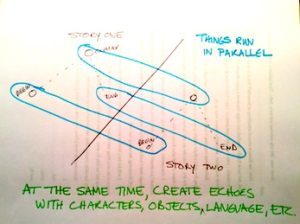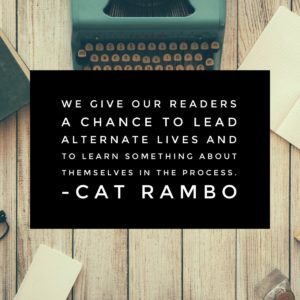Cat Rambo's Blog, page 38
November 6, 2016
Patreon Post: Aardvark Says Moo
 As part of recent updates at SFWA recently revamped the Nebula Recommended Reading list to show up in alphabetical order. It’s a stopgap measure until the website gets re-designed, and to my mind has as many problems as presenting by order of number of recommendations. In musing that over, I mentioned to webmaster Jeremy Tolbert that I looked forward to the new school of aardvarkpunk we were inspiring. A half hour later this story appeared in my head.
As part of recent updates at SFWA recently revamped the Nebula Recommended Reading list to show up in alphabetical order. It’s a stopgap measure until the website gets re-designed, and to my mind has as many problems as presenting by order of number of recommendations. In musing that over, I mentioned to webmaster Jeremy Tolbert that I looked forward to the new school of aardvarkpunk we were inspiring. A half hour later this story appeared in my head.
This is a Patreon story, published thanks to the generous support of my patreons on there; they get additional sponsor-only stories, plus sneak peeks at new drafts and a chance to win my monthly giveaway. If you’d like to support indie publishing plus get stories, sign up to support me there!
Aardvark Says Moo
“Aardvark says moo,” says the clown, handing over the balloon animal.
My overly precocious kid squints her eyes. “No they don’t.” She folds her arms. No eight year old should be that definite about anything. Whatever happened to the idea of childish sense of wonder?
“I was being whimsical,” the clown explains. “Do you understand what that word means, little girl?”
Now he’s gone and done it. I could have warned him, but no one had consulted me since moment one of this interaction. The kid went up, the clown looked at her and started twisting a pink balloon around, and then he had to start being all whimsical.
“Whimsy,” my child says, “is playfully quaint or fanciful. A talking aardvark impersonating a cow is just dumb.”
At this point, a supernatural element enters my story. You may think it’d be something subtle, maybe the sort of knife edged was-it-real-or-not stratagem that Henry James could employ, but the fact of the matter was that it was a Valkyrie, walking up to look us over.
Maybe a woman dressed like a Valkyrie, you’re thinking. A costume party might have occurred to you, maybe, which means you’re going off on a total tangent, so lemme say this. Kid’s birthday party. Bouncy castle, hot dogs, cake. The only costume was the clown’s, and it wasn’t a particularly inspired one.
The Valkyrie moreover is real. Realer than real. Like a black hole of realness that made everything around her look like faded plastic. Her armor is made of golden scales. She smells like ozone and honey and looks like an angry supermodel with no makeup. She says, “Kyle Holiday, I have foretold that you die in the line of duty tonight but I will take you to Valhalla.”
“I’m pretty sure there’s been some mistake,” the clown says. “That’s my name, but I’m not going to die.”
“No one thinks they’re going to die,” the Valkyrie says significantly.
“Hang on,” my kid says. “This is my best friend’s birthday party and no one should die at it. She’s delicate. She’ll be traumatized for years. Take it elsewhere. What’s he supposed to die of, anyway?”
The Valkyrie listens to the air for a moment. “Peanut allergy.”
“I’m allergic to peanuts,” clown Kyle says cautiously, “but that’s why I don’t eat anything at these gigs.”
The Valkyrie shrugs.
“No, I mean it,” my kid says. “No one’s dying.” She grabs a napkin from the table and holds it out to the clown. “Maybe you breathe in some peanut particles. Tie this over your nose and face. Then get out. Better a flaky clown than a dead one.”
The Valkyrie says, “Who are you, to interfere with a hero’s death?”
“One, my name is Anna Louise Mayhew,” my kid says, her chin pointed at the Valkyrie, “and two, he’s at a kid’s birthday party.”
This Valkyrie listens to the air some more. This time it takes longer, and she gets a funny look on her face halfway through.
“Well,” she says, when she finally returns her attention to us, “he dies while working. There’s not that many clearly defined hero’s deaths around any more, but he faces down countless children.”
“And delights them,” she adds as an afterthought. She reaches out and tweaks the napkin off the clown’s face. “You don’t need that. You’ll like Valhalla.” She looks at my kid. “You’re Anna Louise Mayhew, huh?”
Something about the way she says it makes me step up and say, “Anna, why don’t you walk your friend to the gate?” I fold my arms, look the Valkyrie over. She’s about twice my size, could snap me like a twig, but she seems relaxed about it all. I say, “How do you know her name?”
“I take her, later on,” the Valkyrie said. “We always future-remember the important ones.”
I’m torn between pride and horror. “What? When?”
“Relax,” the Valkyrie says. She reaches out and takes a piece of cake and it’s somehow reassuring, makes her seem a little less real and more like someone in a costume. “Not till long after you’re dead. They coax her out of retirement for it. She wins and saves humanity.”
I don’t really want to know anything more than that. I say, “So you’ll forgive her saving the clown?”
“It’s kinda pathetic, taking a clown to Valhalla,” she says. “Sometimes someone screws up the paperwork. I bet this is one of those times.”
Anna comes back and stands looking at the Valkyrie. I can’t tell if it’s fear or admiration or something else. I imagine her as a little old lady, facing down some unguessable enemy, that same solemn expression. The Valkyrie wanders off and vanishes into sparks that travel up into the sky. No one else seems to notice.
These sorts of things happen around my kid a lot, I’ve noticed. I say, “You were kinda hard on that clown about the moo thing.”
“Well, maybe,” she says. “I don’t like whimsy, though. Aardvark goes moo, how twee is that?”
I bet that Valkyrie’s looking forward to seeing her again.
November 1, 2016
For Writers: Working with Twinned and Twined Storylines
Diagram or doodle? It’s all in the eye of the beholder.
When I sat down to work out the outline for my Moving from Idea to Finished Draft, I came up with almost two dozen possible starting points for writing a story, including scene, title, taking an old plot, a character, dialog, a particular device, and more. As I finished writing it, those categories shifted around a little, sometimes sliding together, other times diverging, but I did think I’d managed to exhaust the possibilities……only to be proven wrong, of course. A week or so ago at the Surrey International Writers Conference I was absolutely delighted when an audience member hit me with a new one that I hadn’t considered at all.
When I teach the class, which focuses on how to take an idea and use it to finish a story, I talk a little bit about story structure and writing process, but most of the class relies on asking participants what the idea is that they’re working with. This time, a woman said, “My idea is a twinned story” and explained that she wanted to write two stories in parallel.
You might argue that it’s a particular manifestation of a frame story, which is something covered in the Devices section of the class, but she wanted it to be more than that: her story was about a couple discovering letters in their attic that tell the story of another couple’s marriage. So let’s look at this according to the structure I use in Moving from Idea to Finished Draft, looking at what it is, what it gives you, what considerations you should take into account while writing, possible pitfalls, next steps, and a few exercises designed to increase understanding of the idea.
What It Is:
A twinned story holds two or more plots running in parallel to each other. The connection between them may be strong or more tenuous and faint, but it must exist. The stories should be distinct and are usually separated by location or time. Usually they are given roughly equal amounts of time in the story; one story may be stressed in importance over the other or they may be weighted equally.
However, I want to note that I am distinguishing this from a story with multiple POVs; there are too many differences for that to get lumped in here.
What It Gives You:
The mirror structure actually gives you some very useful things. The first is that if you know the theme of one story, you know the theme of the other, because while it does not have to be an exact copy, it must reflect the other.
Similarly, the action of one story will be echoed in the other, and you may want to look for places where you can create echoes with objects, dialogue, actions, or other elements. If you know one story completely, you should be able to sketch out the other, but it is more likely that you will move back and forth between them, fleshing out elements as they appear in one story and need to be echoed in the other.
Considerations:
That connection between the plotlines is pretty crucial, or else the story will seem pointless and disjointed. It must be apparent to you as well as your reader.
Every time you switch from one plotline to another, you are bumping the reader out of the story and forcing their mental GPS to recalculate their route through it. Give them both the details and the time they need to re-orient themselves in the narrative. Remember that sensory stuff — particularly non-visual — is useful for pulling them back in.
Possible Pitfalls:
As with any device, there must be a reason to use this structure other than “it would be cool to write a twinned story.”
Remember as well that you must carry the plots out to satisfaction and that this will take space. The more plotlines you have the longer your piece will be, and you will need to resist the temptation to skimp for lack of room if you are trying to write to a particular word length.
Remember that you have less space than usual for everything as a result of this, including character development. Make everything count.
If you move about within time inside each of the storylines, providing flashbacks or memories for example, remember that you will need to make sure the reader does not mistake this for a movement to the other story line.
Next Steps:
Take inventory of what you have. Where are the blank spots in both that you will need to address? What can each lend its partner?
What are the differences between the story? Are there any you need to reconcile in order to make the parallels between them stronger?
How will you mark the transitions between the two storylines?
Map out the chronology of both storylines; you must know this in order to have them run in parallel.
Exercises:
Figure out some differences between the main location for each story. If time is the difference, what has changed and what existed in the earlier landscape that is transformed or accommodated for in the later one? Along the same lines, if location is the difference and time is not, how is the time of year reflected differently in the two locations? Are there cultural aspects of society that change as well?
Sketch out the main character(s) of each plotline and pair them with their alternate in the other story. List three differences and three similarities between them.
Why are you using this device? List three things that you can do in one story that enhances the other one, such as having the same character appear in each in a way that deepens the reader’s understanding of them, showing how a landscape changes over time, or exploring the idea of inheritance.
In the class material, I try to provide an example of a story that came out of each kind of inspiration, but I don’t have one of these (how can this be?)! So I’m working on one, “The Sheriff Who Dreamed of Astronauts,” which Patreon supporters will get both early glimpses of and a first chance to read when it’s done, and that will get added to the class material at some point.
In the meantime, if you’d like to read interesting examples of this technique, I highly recommend Katherine Blake’s Interior Life for an innovative example, Fried Green Tomatoes at the Whistlestop Cafe by Fannie Flagg for a traditional but highly satisfying example, and If On a Winter’s Night a Traveler by Italo Calvino for something that will really stretch you and make you think while (I hope) delighting you..
If you’d like some interesting audio talk about such things, here is Linda Aronson talking about parallel narratives (unlike me, she includes narratives of parallel characters):
And here is Quentin Tarratino talking about non-linear narrative in a way that may be useful:
October 30, 2016
Free Halloween Story: The Silent Familiar
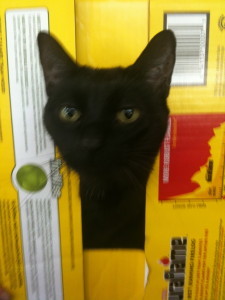
Raven wishes you all a Happy Halloween!
This is a fantasy story I wrote a while back for a Halloween story contest. It’s reprinted in fantasy collection Eyes Like Sky and Coal and Moonlight.The Silent Familiar
The Wizard Niccolo was not happy. At the age of 183 — youthful for a wizard, but improbable for an ordinary human — he had thought certain things well out of his life. Sudden changes in his daily routine were one. And romance was another – even if it was his familiar’s romance, and not his own.
“Could make an omelet with it, I suppose,” he grumbled to his familiar, the tiny dragon Olivia. She sat on the cluttered mantle, wrapped around her egg, still marveling at its production and entirely too pleased with herself. A pair of alabaster candelabra sheltered her in a thicket of gilt spirals, and a stuffed salmon, labeled “First Prize – Thornstone Village Centennial Celebration,” regarded her with a sour gaze.
“Master,” she said, blinking luminous eyes. “Have I not served you well?”
“For the most part,” he admitted.
She stayed silent and after a pause, he said, “Yes, invariably, Olivia. But who will hold your loyalty, that egg or I?”
“Both,” she said and stoked her scaled cheek along the egg’s smooth surface. “But I will never value it higher than my service to you.”
Wizards’ familiars are unnatural creatures. Some are much like any other animal: a cat, perhaps, with black fur, a droop-winged crow, or a snake with emerald scales. Others look less innocuous and more fantastical – homunculi and tiny, perfect dragons like Olivia, or shaggy-warted mandrake plants. Given this, it is surprising that two of them managed to have compatible body parts, let alone produce an offspring. And yet, three months after a purely platonic sojourn of Niccolo with a sorceress whose library was vast enough to entice all sorts of other mages to her door, this had happened. Niccolo had been researching how the gods manifested themselves, and the library tomes had been unfamiliar enough to hold all his attention. Enrapt in ancient texts, he had overlooked Olivia’s activities.
Niccolo scowled at her. “Do you intend to make a habit of this?” he demanded.
“Oh, I don’t know,” Olivia said absently. “I didn’t like the last part, the laying. The getting ready to lay, though…”
Niccolo put up his hand. “I do not want to know.” He turned away. “How long till it hatches?”
“I don’t know,” Olivia said. “I’ve never done this.” She crooned deep in her throat, an unsettling noise Niccolo had never heard her make before.
Grumbling, he stalked out. It’s probably not even viable, he thought. How long would Olivia fool herself into believing it would hatch? When he had created her, coaxing her winged form from a malachite shard, a bit of bone and a lizard’s scale, he had endowed her with a sardonic wit and a capability for banter – requisites for any wizard’s familiar. But he had always prided himself that Olivia was smarter than most. Smarter than this deluded maternal ambition would seem to indicate.
Had he erred when making her? Familiars were repositories for wizards’ emotions, one of the means by which they stripped away their humanity and became immortal. Perhaps he’d put too much in her, though. He considered thoughts of a new familiar, but reluctantly. At times, when Olivia rested on his shoulder or curled in his lap, he felt the struggle of his emotions, the desire to pet her like a cat warring with a shrinking away, a don’t-touch-me shudder. He was still young for a wizard, still trying to learn what magic meant. Still trying to become more than human.
He sighed. After a few months, he’d try to get Olivia to see reason and abandon her effort.
***
Three months later, Olivia still spent most waking hours curled around her egg, drowsy contentment evident in the set of her wings. Niccolo had resigned himself to her absent-mindedness. He had been working on a set of experiments involving aqua vitae and a supposed phoenix feather, coaxing bits of down away from the shaft. He hoped to evoke fiery gold, but so far all he had was soggy fluff.
He looked up from the alembic on his worktable as Olivia chirped.
“I’ve told you before, don’t make noises while I’m…” he began, but she ignored him.
“It’s hatching! It’s hatching!” She unwrapped herself, backed away from the egg, eying it. “What do I do?”
“It’s your egg!”
“I’ve never done this before!”
They both gazed in fascination as the egg wobbled.
“Should I get some hot water?” Niccolo said.
“What are you planning on doing, cooking it?”
“They always seem to fetch hot water for babies.”
The egg rocked back and forth as its occupant shifted.
“Maybe it can’t get out,” Olivia worried. “Should I help it?”
“Give it time,“ Niccolo said.
They stared as though mesmerized. The egg tipped, tottered…toppled from the mantelpiece. Olivia shrieked even as Niccolo dove for it, his heart almost stopping.
The egg shattered in his hands and what he held there almost made him drop it. For an instant he thought it dead. Then the tiny lizard mewled and Olivia’s wings were fluttering in his face even as he tried to set the infant down. Chaos reigned for a moment before Olivia was curled around her offspring while Niccolo crouched on his knees, ignoring the arthritic twinges.
The baby was, despite all of Niccolo’s thoughts about mutants and monstrosities, perfect. Like Olivia, it was a miniature dragon’s form, with frilled, lacey wings that stretched out now, trembling, to dry. Glistening amniotic fluid hung in thick strands from them.
Niccolo took a damp cloth and tenderly cleaned the wings as Olivia fussed and twined around his hands.
“You did well, Olivia,” he admitted, looking down at her child. “You did well.”
***
Almost all wizards have hobbies, and they refuse to taint these grand obsessions with magic. Niccolo’s was fishing. He knew every trout stream in the forest surrounding his retreat, and his favorite was an unnamed brook that chuckled its way through beech groves and sandy sloughs, past a stand of willows whose roots had gnawed away at the bank, creating holes and riddles where trout might lurk in the hot afternoons, waiting for evening. A fallen tree formed a bench where Niccolo could sit, his creel beside him, lined with fresh moss and ready to hold his catch.
He threaded his rod and attached a caddis fly lure Olivia had helped him create. He wasn’t sure that using her to assist didn’t count as magic, but his fingers shook, and she was still as deft and nimble-clawed as when he had first created her almost a century ago. The lure’s underbelly was yellow as daffodils and its wings were bits of brown feather. Deep in its guts was the hook, barbed to catch hold of a trout’s tender mouth and let Niccolo coax it ashore.
Hours passed as he cast and drowsed, waiting with the patience only a fisherman knows. A few times he felt the tentative twitch of the hook and paused but the trout were wary and skittish that day. With the coming of dusk, he knew, though, they would grow hungry and strike hard at the insects lighting on the water, his lure whirling among them.
His purpose was not to catch fish, but to think. He contemplated Olivia. Every wizard needs a familiar, like a second voice speaking the things that she or he has left behind, the barbs and commonplace facts of life that a wizard tries to divest themselves of in the quest for immortality.
Familiars were like second souls, advice you could trust. You could make a familiar, as Niccolo had, and place bits of yourself in it, but it was hard. Few had accomplished it, and most wizards relied on familiars already fit to speak. Ravens were popular, and a line of talking cats in Loudontown had furnished familiars for the wizards’ school there for decades.
Talking. That was what distinguished familiars from most animals, aside from various prophetic creatures. It worried Niccolo that the offspring, which Olivia had named Hrist, had yet to speak. Was it possible that unlike its parents – it lacked intelligence? As the months passed, he had watched it, trying to determine what was passing through its mind. It seemed to respond to words, to “no” and “dinner” and such, but after all – a well-trained hound might do as much. Had Hrist lapsed to an animal’s natural state, lacking the spark that his parents had possessed?
Olivia rejected this notion when Niccolo proposed it to her that night over a dinner of fresh-caught trout and bread from the nearby village.
“Hrist is as smart as you or I,” she said indignantly. “Perhaps even more so, in your case.” She looked over at Hrist.
By now, the winged lizard extended six inches from snout to tail, half his mother’s size. He lay on the windowsill in the sun, regarding his reflection in the dust-flecked glass with a placid gaze.
“Indeed,” Niccolo said dubiously.
Hrist swiveled his head, looked Niccolo in the eye, and nodded once.
Niccolo blinked, astonished.
“If he can understand us, why can’t he reply, Olivia?” he said.
Olivia’s tail swished. “He can’t talk,” she said.
“You and his father both have fully formed – perhaps even more so, in your case – vocal apparati. There’s no reason why he shouldn’t.”
Of course, there was no reason why Hrist should exist in the first place, Niccolo thought, but Olivia would become even more furious if he said that.
And Hrist was, Niccolo admitted, a charming little creature. He loved to hunt and would spend hours in the vegetable garden, haunting the zucchini and pepper plants in order to eat squash vine borers and yellow and black striped cucumber beetles.
As the little dragon grew, Niccolo worked at teaching Hrist how to write instead. The dragonling quickly learned, using his long tail much like an ink pen, dipping it with a sinuous twist in the inkwell and employing the pointed tip to scrawl on parchment. He shared his mother’s quick and sometimes sardonic wit, but his observations were written out in a meticulous, careful hand.
He took to reading like a duck to water, and Niccolo would find him draped over a volume, carefully scanning the words and turning the pages with his flexible, almost prehensile tail.
“I don’t know why I can’t talk,” he wrote when Niccolo questioned him. “I try to speak and nothing comes out but air.”
He could make noises, the hisses and chirps and rumbles that Olivia regularly engaged in, which comforted Niccolo somewhat. But try as he might, he could not give his familiar’s child a voice.
“What will he do?” Olivia worried. “No wizard will take him on as a familiar if he can’t talk.”
“You don’t know that for sure,” Niccolo argued, but in his heart he knew that Olivia was right. Wizards were proud. No one would want a defective familiar. Familiars were reflections of one’s heart and soul.
Still, he would try.
***
Niccolo consulted one of the few non-human wizards he knew. Most of the magic users he was acquainted with shunned Slith, a wyvern’s child whose scales, slit eyes, and sinuous, boneless grace unnerved them. His tower, perched halfway up a volcano, was rarely visited and as Niccolo ascended the mountainside, he wondered whether Slith blamed his race or his location for his isolation.
Slith listened, his golden eyes considering, as Niccolo described Hrist’s condition, concluding, “How will any wizard take him as a familiar? He’s defective!”
“Have you ever thought,” Slith said, “that your problem may be your solution?”
Niccolo looked, puzzled, at the other wizard and Slith’s eyes took on a self-congratulatory gleam. Wizards love riddle games, and confounding another wizard was a rare prize in that competition.
“A familiar’s powers develop in response to their wizard,” Slith said. He nodded towards his own familiar, a lop-eared, brindled tomcat named Slasher.
Slasher yawned and said, “It’s true. Before I became a familiar, I couldn’t talk.”
“Truly?” Niccolo said. He was not well-versed in familiar lore. Most wizards weren’t, but rather took their familiar for granted, a tool like an athame or a well-crafted amulet.
“Truly,” Slith said. “Find the right wizard and the problem will no longer be a problem.”
***
“Get the house ready,” Niccolo told Olivia. “We’re going to take on an apprentice.”
She gaped. “But Master, you don’t like apprentices! You’ve always said they were more trouble than they were worth!”
Hrist was outside, chasing bumblebees, so Niccolo spoke freely. “Yes, but what do apprentices grow up to become?”
Olivia was quick-witted as ever. “Wizards! You think that one of them will…”
“Perhaps,” Niccolo said. “Don’t get your hopes up too much, Olivia.”
“How will you get them here?”
Niccolo tapped the thick envelope on his desk, which had arrived that morning. “I’ve offered to instruct them in hydromancy,” he said. “I knew the College had no one specializing in it. It’s obscure enough that the Dean couldn’t justify the expense, but I’ve agreed to allow myself to be hired, for a small fee, to instruct them. Each will arrive, spend one month learning its basics and then depart. Sooner or later, the right one will arrive for Hrist.”
Olivia’s eyes held admiration, and Niccolo allowed himself to run a fingertip along the smooth skin of her sides in an almost-caress. Surely, Niccolo thought, there was no harm in the trace of affection he felt. Wasn’t that the basis of sympathetic magic, after all, a fondness of one thing for another?
***
The first apprentice was Albert. He had red hair that stuck out like a ransacked haystack and bright, merry blue eyes. Hrist hated him on sight, and Albert bore out the little familiar’s judgement in full measure.
Niccolo, unfortunately, liked him. The apprentice reminded him of Olivia in the quickness of his quips, the slight barb to his wit. Much like Niccolo had been at his age, before he put away that side of him to focus on magic. Albert’s pranks amused Niccolo more than he wanted to admit, despite Olivia’s exasperation with household upsets, with salt in the sugar bowl and spiders in the tea.
Albert sensed Niccolo’s mood, and his pranks expanded exponentially, knowing that punishment would not fall on him. Albert went so far as to involve the elderly wizard as a conspirator at times, much to Olivia’s fury, since she or Hrist were the target.
And then one day as Niccolo and Albert were working out the Seven Aquatic Principles, Albert said, “I have a fine idea for a prank on the Dean of Loudontown.”
“What’s that?” Niccolo asked, intrigued. The Dean was a stiff and formal woman, and Niccolo found the thought of her discomfited in some way an appealing one.
“We’ll ship Hrist to her and say that he’s under a curse, that’s why he doesn’t talk. Either the Dean will try to lift it herself or she’ll set it to someone as a test.” Albert laughed. “Imagine how much time they’ll spend on the runt, thinking they can fix him!”
“Hrist…is not broken,” Niccolo said slowly.
Albert didn’t catch the warning undertone in his teacher’s voice. He continued, “Might as well use him for something, he’s useless for much else besides catching spiders.” He laughed.
“Pack your things,” Niccolo said. “You’re going back to Loudontown. And if you want to be a wizard, Albert, you’ll put away this sense of humor. When you have a familiar that you can store it in, you’ll understand.”
And so, bewildered, Albert departed to play his tricks elsewhere.
***
The second apprentice was Chloe. Niccolo had to admit, he was pulling for her as well. She was clear-eyed and grave, and wore her pale hair tightly knotted atop her head. She played chess well, and she and Hrist would sit for hours over the chessboard, the dragonling studying the pieces from a higher vantage point before fluttering down to move a pawn or bishop with his tail.
And yet, once Chloe had finished her studies with Niccolo, she came to him and said, “I do not want Hrist as a familiar.”
Niccolo found himself awash in denials . “I didn’t…I mean, we weren’t intending…”
Chloe’s eyes were remote. “You want to find him a wizard. I picked up that much. After that it was simply a matter of thinking why a wizard who had never shown any previous interest in teaching would have suddenly acquired it. It’s very kind of you.”
He was not sure whether or not the words were a compliment.
But Chloe was young enough that they were the praise they seemed – though she might not think the same in another century or two. She smiled at him.
“Have you ever thought,” she asked, “that Hrist might find some path other than familiar?”
“I had,” Niccolo said. “More than once. But Olivia has her heart set on it – she doesn’t want him to become ‘some ordinary pet,’ she said.
“A chess-playing dragonling whose penmanship is as good as any monk’s?” she said. “I do not think anyone will ever consider Hrist ordinary.” She smiled again and Niccolo decided it was a good thing that she was moving on, perhaps. Chloe made him think of altogether too many human things, and that would be good for neither of them.
***
The third apprentice was Ibbi, who had a rounded face and the merest intimation of fuzz on his cheeks.
He was a disaster. He arrived with the bottle of brandy the Dean had sent to Niccolo shattered and dripping through his luggage, which retained the smell of expensive alcohol for weeks. He broke three plates, a mug, and Olivia’s favorite candlestick washing up the first night. Things went downhill from there. He could not master the simplest cantrip that Niccolo set him, his pronunciation of Latin was atrocious, and his fingers seemed all disjointed thumbs.
Hrist adored him. And so, despite misgivings, Niccolo let him stay and be taught. And at the end of a month, when Ibbi had failed to learn even the simplest water-based charm, Niccolo lied to the Dean and said that Ibbi was doing so well that he intended to keep him an extra month, continuing through till Samhain.
Privately, he thought perhaps a clumsy wizard and a defective familiar might fit well together. Perhaps Hrist could give Ibbi the assurance he needed. And Ibbi…well, Hrist needed a voice.
But the days went by, and Ibbi showed no signs of improving, or of bonding with Hrist.
Samhain was celebrated in the nearby village, and when Niccolo went there a few days before it, he saw the preparations underway: festoons of ivy disguising the doorways, plump jack-o-lanterns set to illuminate the square, wood piled for the holiday’s bonfire. When he mentioned it at home, Olivia clamored to attend, while Ibbi’s eyes sparked with enthusiasm. Even Hrist seemed intrigued, asking question after question on a parchment scroll as Ibbi tried to answer.
“Why is this celebrated?” Hrist wrote.
Ibbi stammered, “It’s when the veil between worlds is torn. Barriers drop on Samhain.”
“Barriers?” Hrist wrote the word in a single twist and flick of his tail.
“Barriers,” Niccolo said. “Things are thinner on Samhain. Things disguise themselves as each other, and alliances that might not be made on other nights are enabled.”
“The God of the Darkest Night, Cerunnos, appears,” Olivia said. “He will grant one boon. But no one ever asks.”
“Why?” Ibbi said.
“Have you learned nothing? Because gods twist wishes,” Niccolo said. “It takes a well-trained mind to construct a wish that a god can’t weasel out of. They split hairs finer than any lawyer. So the god appears and blesses the participants, and then we are done.”
Ibbi gave him an uncertain look. Increasingly he was nervous in the older wizard’s presence, as though he sensed Niccolo’s growing disappointment with his performance. Niccolo felt a surge of compassion and for once did not try to battle it back.
“We’ll all go for the bonfire,” he said. “You will need a costume, Ibbi. Samhain is a day for pretending to be something other than you are.”
“Will you wear one as well, Master?” Olivia asked.
Niccolo snorted, but Olivia was not to be deterred.
“You’ll make the villagers uneasy unless you do,” she said. “I’ll find something.”
***
Early on Samhain eve, Olivia presented Niccolo with his costume. He snorted once again, but put on the dress and wig. She had chosen to clothe him as a tavern maid, and he thought irritably that if he could still feel the emotion of embarrassment, he would have objected. But Samhain was a day for fools and opposites, and he would play along, for her sake and that of Hrist and Ibbi. Olivia had clearly taken care with his costume. The dress was snug, but he could fit in it, along with a false bosom. He drew the line at the cosmetics she had somehow procured and laid out. He made an ugly woman, he thought, looking in the mirror, but that was mostly the beard.
Olivia had outdone herself, though, with Hrist and Ibbi. Ibbi wore a scaly cloak, and green mask, while Hrist simply wore a tiny wizard’s hat and clutched a matchstick wand.
“You’ve disguised them as each other!” Niccolo realized, and Olivia nodded, looking smug. She had chosen to drape herself with beads and jewelry till she was simply a glittering heap.
“What are you?” Niccolo asked.
Olivia peered out from between the links of a tarnished golden chain. “A dragon’s treasure horde!” she announced. “Can’t you tell?”
Despite himself, Niccolo laughed.
***
Cheerfulness continued to buoy him, despite his best efforts to dampen it, as they made their way to the village. Niccolo was not the only person to have chosen a costume that depended on gender. Several other men minced about in dresses even more gaudily decorated than his, and the owners of the local tavern, the Greasy Eel, wore gentlemen’s dress coats and buckled breeches.
Usually the villagers were standoffish (except when making their way to his cottage to ask for luck charms or philters to ward off disease) and Niccolo was pleased to note that his costume dissolved some of the usual social ice. Olivia rode his shoulder, jingling and jangling like a paste and brilliants brooch, and Hrist stayed curled around Ibbi’s neck, occasionally jabbing his ear with the point of his cap.
As the darkness grew and the bonfire blazed, as the mugs of cider were passed around with potatoes roasted in the embers, Niccolo fought to keep from enjoying himself. Instead, he watched Hrist, whose presence fascinated the village children. One held Hrist in his hands, holding him up to admire him in the firelight and the little lizard permitted it, his mother looking fondly on from Niccolo’s shoulder.
“Master?” she whispered in his ear. “Master, you can construct wishes. You are a well-learned man. Could you not ask Cerunnos that my child be given a voice?”
“Don’t be ridiculous, Olivia!” Niccolo snapped. “I thought you claimed you would not put the egg before me, and now you’re asking that I meddle with a god on its behalf? Have you no concern for my well-being? I am a poor enough wizard as it is, letting emotions sway me as I have!”
“But…” She subsided into silence as he scowled at her.
“We will hear no more of this,” he said.
In the fire’s dancing light, her eyes glittered like the jewels in her costume, but he could not read the emotion there.
At midnight, the crowd gathered around the fire, and masks were doffed. Niccolo took off his wig, sticking it under his arm. Ibbi stood beside him, having reclaimed Hrist from the reluctant children.
The faces across the fire were horns and feathers, slips of skin and eager eyes that stared, like Niccolo and his tiny group, into the heart of the fire, waiting for the God.
He grew so slowly from the flames that no one knew when he arrived. Great curling ram’s horns, dripping with ash and fire, sat his shoulders. His cloak was night, and its lining gleamed with subdued stars.
He did not speak, but looked about the circle, waiting. There was resignation in his shoulders. Niccolo wondered how long it had been since anyone ignored the thousand cautionary tales and asked the god for a boon.
And then, from his shoulder, impossibly, Olivia spoke.
“Cerunnos, hear my plea!”
“No,” Niccolo said, and grabbed at her with panicked fingers, but all he caught was a netting of gilt and rhinestone, and she was hovering in the air before that patrician figure. “Olivia, no!”
The god gestured, and Niccolo could no longer speak. The massive face, still as a statue, listened.
“My child…and my master,” Olivia said. “Let them be what they want, what they aspire to! Grant me this, Cerunnos!”
Fire coursed through Niccolo, chasing away the panic.
The god considered, spoke. “No matter the price?”
“No matter the price,” Olivia said, and Niccolo knew she was doomed. He was being pulled into the fire, with Hrist, and somehow Ibbi, the three of them among the flames but not burning. He glimpsed Hrist, the doll-sized wizard’s hat askew, clinging to Ibbi, and hope surged in him before he was pulled inside the shadow of Cerunnos’ cloak, and darkness overtook him.
***
After the god had gone away, after the villagers had scattered, as the dawn began to glimmer over the forest like an uncertain plea, Niccolo raised his head and spoke to Ibbi and Hrist beside the smoldering ashes of the fire.
“Well?” he said. His words were rough. In his hands was Olivia’s body, broken by the magic that had surged through her in answer to her prayer.
Ibbi and Hrist stared at each other. Then Hrist spoke. “I can speak. But I am still not a familiar,” the little lizard said.
“No.” Ibbi stretched out his hand and suddenly laughed. “But I am no longer a wizard.”
“What?” Niccolo said, trying to understand.
They turned to look at him in eerie unison. Olivia was heavy in his hands.
“I am a familiar,” Ibbi said, and looked at Hrist.
“And I the wizard,” Hrist said. “You will bear the sorrow for me, Ibbi.”
So Ibbi wept obediently as Niccolo and Hrist buried Olivia’s tiny form in the garden, between the rows where Hrist had hunted flies and pill bugs in the summer sun. They placed her finery beneath her, as though she were in truth what she resembled, a dragon curled on a horde of gems and coins and precious metal and a caddis fly lure. She lay with her snout laid atop her paws, eyes closed and tail curled about her as they took handfuls of dirt and closed her into the earth’s darkness.
Ibbi wept.
But Hrist and Niccolo were true wizards now, and they felt nothing at all.
The End
Enjoyed this story? My Patreon supporters will be getting a fresh one, starring another familiar, this time in 1890s Baltimore in the steampunk world of Altered America. Want to get the same private look they do? Sign up to support me!
October 25, 2016
Into the Abyss: Surrey International Writers Conference, Morning Keynote for October 23, 2016
I found some pieces of my speech illustrated on Twitter, which was nifty. Here’s one Joyelle Brandt put up.
I was asked to stick the speech up online; this is not a literal transcription, but based on my speech notes. I’ll write up some additional notes later on this week. Here is the speech.(after a little banter about muffins) I would ask you all if you’re having a good time but I know that you are. Because I’ve been so impressed by the enthusiasm, the professionalism, and the talent here, and amazed at how well the presenters are taken care of by the conference. Thank you for the chance to be here.
I figure you are all already stuffed full of writing advice, so I wanted to give you some things for after the conference.
First off, go home and sleep. Decompress. You’ve been working hard all weekend and you deserve it.
Then start to work. If you’re a notetaker, go back over your notes. I still go over mine from Clarion West in 2005 every once in a while. If you’re not, go look to see what other people have written up. I guarantee you’ll find some blog write-ups and other notes. Go find what you might have missed.
And use those notes and ideas to start to write. I try to write, every day, 2000 words, because that’s what Stephen King does and I think he’s a pretty good role model. Note that I say try, because I don’t always hit it. But you must write. Every day you write is a victory.
Figure out your personal writing process and what works for you. And then do it, lots. I realized that my most productive time is the mornings. So if my mother calls in the mornings, she knows I will answer “Is this an emergency?” and if she says no, I will hang up. (I did warn her before implementing this policy.) Find the times and places you are productive and defend them from the world. You will have gotten a lot of writing advice here and the thing about writing advice is this. All of it is both right and wrong, because people’s process differs and moreover, it can and will differ over the course of time. Find what works for you and do it.
Be kind to yourself. We are delicate, complex machines both physically and mentally. Writers are so good at beating themselves up, at feeling guilty, at imagining terrible futures. You are the person with the most to gain from being kind to yourself; do it. Don’t punish yourself for not hitting a writing goal; reward yourself when you do.
Seek out the peers who encourage and stimulate you. If you exist in an isolated place, there is the Internet. For example, sometimes Mary Robinette Kowal opens up a Google Hangout and invites some people and we all write together, simultaneously alone at our desks across the world and yet in each other’s company.
Read both in your genre and outside it, and remember that you cannot write anything better than the best stuff that you’re reading. Don’t let being a writer spoil your pleasure in reading. That would be a terrible thing. Instead, read for pleasure and then, when you find a book that you either love or hate, go back and reread it to figure out why. If there’s something a writer does that you think is nifty, steal it and use it. That’s absolutely valid. That’s how writers learn.
Persistence is important, as important as talent. Here’s an example for you. I had a story come out this year in The Magazine of Fantasy and Science Fiction, a novelette called “Red in Tooth and Cog.” It was my 44th submission to the magazine. And it wasn’t that the other 43 stories were bad stories – they all went on to find good homes and a few got award-nominated – but that they weren’t right for the magazine at that particular time. You must be persistent.
Volunteer if you have the time and resources — but with a plan. It’s a good way to be engaged with the larger community. One of the things I tell my students is to do some slush reading for a magazine. It’s a great way to get a feel for the editor’s side of things and to realize what the submission pile is like. Because one of the things you’ll learn is that no editor, or agent, or publisher says “Send me something” to be kind. There are just too many submissions flying at them on a daily basis for anyone to say that and not mean it. So if someone tells you that, do it, and do it sooner rather than later. You can learn a lot volunteering as a slush reader; just don’t do it too long or it will kill your soul.
Or volunteer with a conference like this one. You’ve seen what an enthusiastic and pleasant crew they are to work with over the course of this weekend. But only volunteer with one thing, and use it to deflect other requests. That’s what I do with SFWA, because I am sinking plenty of time into that, and I simply cannot take on other things. You must learn how to say no to things in order to survive as a writer.
But this brings me to the most important part. Writers live double lives. Many of you will have had that weird moment when the internal narrator first manifested and your life acquired a voiceover along the lines of, “She went to the cupboard and opened the door. She took down the cinnamon. Sprinkling it over the coffee, she inhaled. Etc.” We live and we watch ourselves living.
It is not enough simply to witness, to be such watchers. We must also act. Writers must be not just reporters, but leaders. To write about a character trying to do their best, you must do so yourself.
This weekend the question of diversity and how to achieve it has been raised over and over again. It’s so encouraging to have this fact acknowledged: diversity is not a trend. It’s a way of moving towards a more honest reflection of reality.
These are times when empty and inflammatory rhetoric increasingly dominates the public discourse. These are times when the repetition of mistruths to make them truths is a strategy exercised over and over again. These are times when we have a wealth of dishonest words.
We are the counter to that.
Because as writers, we write the truth of what it is to be a self-aware, self-directed creature in a universe that feels cold, hostile, and even downright unfair at times. Every story has that core. Whether it’s about wizards, spaceships, cowpokes, serial killers, whatever. We let our readers lead alternate lives and learn something about themselves in the process.
What does that mean for us as writers, as part of that grand and illuminating tradition? That we must live bravely and unflinchingly, knowing that we are imperfect creatures that can win only for the moment, if that. That we must speak our truths, the ones we have come to, honestly and fearlessly, knowing that sometimes — perhaps even often — we will be misunderstood. That we must throw ourselves into the abyss and spread our wings, trusting that we will fly.
Because we will. You will. I will. And in doing so, we will create the stories that lift our fellows upwards.
So go home. Sleep. And then when you are ready, spread your wings and begin to fly.
October 11, 2016
Nattering Social Justice Cook: Be Kind to Yourself

Being a little silly sometimes is also good for one’s mental health.
Gail Z. Martin has organized the #HoldOnToTheLight campaign, and when she asked me about participating, it seemed important to add another voice. Here’s what the campaign is:More than 100 authors are now part of the #HoldOnToTheLight conversation! Our authors span the globe, from the US to the UK to Canada, Australia and New Zealand. Even more exciting is that as the campaign picks up traction and visibility, more authors want to join, meaning a growing, vibrant dialog about mental wellness and coping with mental illness.
#HoldOnToTheLight is a blog campaign encompassing blog posts by fantasy and science fiction authors around the world in an effort to raise awareness around treatment for depression, suicide prevention, domestic violence intervention, PTSD initiatives, bullying prevention and other mental health-related issues. We believe fandom should be supportive, welcoming and inclusive, in the long tradition of fandom taking care of its own. We encourage readers and fans to seek the help they or their loved ones need without shame or embarrassment.
We’ve also been talking with conventions to encourage them to add, expand or promote their panel programming about mental wellness issues. ConCarolinas, GenCon, Capricon and ContraFlow have let us know that panels are in the works for 2017, and both Capclave and Atomacon are looking at options!
In knocking around this world, one of the few things that has sunk in well enough to make it a daily maxim is this, “Be kind to yourself, because you can depend on yourself.” Build a treat into your day that is aimed at increasing your daily happiness: lunch outside, a long walk, that book on Amazon you want every once in a while.
We all have a shitty time of it sometimes — maybe it’s something we live with all our lives, or something that intrudes and sets up for a total, utter loop: the event that causes PTSD, the relative with a terminal illness, some terrible loss beyond words that feels like a permanent gut-punch.
I’ve found that writers excel at angst and guilt, at worrying at 2 am over whether or not they stuck their foot in their mouth (human nature being what it is, the answer is sometimes yes), at being anxious and projecting futures far out of proportion to actuality in their horror.
They’re also tough on themselves, holding themselves to sometimes impossible standards. It involves being willing to forgive yourself and the illness you live with, to not just know yourself but be comfortable with yourself.
Be kind to yourself, because you’re the person you’ll be living with for the rest of your life. Be a good roommate, one who leads by example and keeps the place neat (or at least livable, since mileage varies.) Don’t go off on guilt trips.
For me, that involves taking care of your physical health, since often your body affects your mind. I started eating a cup of plain greek yogurt for breakfast every morning a few years ago, and found it keeps me cheerful, energetic, and a lot more stable mood-wise. At the same time I started striving to walk at least a few miles every day (I’m on Fitbit as catrambo) and found that a mood elevator as well.
I don’t by any means intend to say that this is the only way to assist with your mental health. But being kind to yourself is a fundamental way to do, no matter how it manifests. And in these days when politics leans harder and harder towards rhetoric of violence, we must be prepared to model compassion, to model unflinchingness in the face of bullies in the defense of the weak, even when the weak one is yourself.
This is why I tell my students not to punish themselves for not hitting their word count, but to reward themselves when they do. That’s a basic way of approaching it, and like many basics, it can have a profound influence.
So give yourself a treat today. Go ahead. You deserve it.
And to fill in the cookery part, I want to give you the recipe for the muffins I make for my household, which make for a nice mid-morning snack providing fiber, protein, and a touch of sweetness to make them hit the spot.
It’s also versatile; you can add or subtract stuff to cater to individual tastes as long as you don’t go too far outside the wet to dry to fat proportion. It’s based on the Orange-Scented Corn Muffins recipe in Breaking the Food Seduction by Neal Barnard.
Mid-morning Muffins
Makes 12
1/2 cup mashed silken tofu
1/2 mashed banana (the riper the better, other fruit can be substituted)
1/2 orange (or other fruit) juice
1 tablespoon oil
1 1/2 cup whole wheat flour
1/2 flaxseed meal
1 T orange zest (or lemon is nice too)
1 t cinnamon (1/2 t cardamon is also pleasant. If you’re doing lemon zest, try rosemary instead of the cinnamon for a more savory version.)
2 t baking powder
1 t baking soda
1/2 salt
Optional adds: a handful of chopped up dried fruits, nuts, or sunflower seeds, a couple of spoonfuls of jelly or jam, 2 T honey/agave or 1/2 t stevia, 1/4 chia or poppy seeds.
Preheat oven to 350 degrees F.
Oil/mist/whatever 12 muffins cups with nonstick oil or butter (coconut oil is nice).
Blend tofu, banana, juice, and oil until smooth and creamy.
Whisk together dry ingredients in a large bowl.
Mix in wet mixture until moist but don’t stir very long, just enough to get stuff combined.
Spoon evenly into muffins cups.
Bake 20-25 minutes.
Remove from oven and loosen muffins in the cups, turning them on their sides to cool. Cover the pan with a clean kitchen towel. After 5 minutes, transfer to a cooling rack or waiting hands.
#sfwapro
October 5, 2016
Rambo Academy News: Not Too Cool for School

An illustration from Wade’s class.
Here’s the press release:A cool Cat’s school just got even cooler.
In 2011, speculative fiction writer and teacher Cat Rambo moved her Writing F&SF Stories class from the live classroom to a virtual one, via the then-brand-new technology Google Plus Hangouts. A few years later, Rambo has taught literally hundreds of class sessions, and provides her most popular classes in on-demand form.
Now the Rambo Academy for Wayward Writers adds three new teachers to its line-up: Ann Leckie, Rachel Swirsky, and Juliette Wade. Each presents both a live version of the class, limited to eight students and taught via Google Hangouts, as well as an on-demand version.
Swirsky’s class, Old Stories Into New, discusses existing forms and how genre writers draw on the stories that have preceded them–particularly folklore, mythology, and fables, but also beloved literature and media. The class presents the best methods for approaching such material while warning students of the possible pitfalls. Readings, written lectures, and writing exercises from Hugo and Nebula award winning writer Rachel Swirsky teach the student how to keep work original and interesting when playing with familiar stories. A live version will be offered on October 29, 2016; the on-demand version is available here.
Wade’s class, The Power of Words, focuses on the study of linguistics and its relevance to genre writing. Wade shows how linguistics differs from the study of foreign languages, and gives a survey of eight different subfields of linguistics. The class examines principles of language at levels of complexity from the most basic articulation of speech sounds to the way that language is used to participate in public forms of discourse. Wade looks at how each subfield can be used to enhance a writer’s portrayal of characters and societies in a fictional world. Then she takes the discussion to the level of text to consider how principles of linguistics can hone point of view and narrative language in storytelling. A live version will be offered on December 17, 2016.
Leckie’s class, To Space Opera and Beyond, will centers on space opera: its roots as well as its current manifestations as well as how to write it. Topics covered include creating and tracking multiple worlds, characters, and plots, interlocking and interweaving plots, writing storylines stretching across multiple books, and developing engaging and distinct politics, languages, and other cultural institutions. Both live sessions of the class are sold out. The on-demand version will be available in November.
Live classes are co-taught with Cat Rambo; registration details can be found here. One student slot in each live class is reserved for the recipient of a Plunkett scholarship, an applicant whose economic means do not otherwise allow them to take the class. More information about applying for Plunkett scholarships is available on the registration page.
Ann Leckie (http://annleckie.com) is the author of the Hugo, Nebula, and Arthur C. Clarke Award winning novel Ancillary Justice. She has also published short stories in Subterranean Magazine, Strange Horizons, and Realms of Fantasy. Her story “Hesperia and Glory” was reprinted in Science Fiction: The Best of the Year, 2007 Edition edited by Rich Horton. Ann has worked as a waitress, a receptionist, a rodman on a land-surveying crew, and a recording engineer. She lives in St. Louis, Missouri.
Rachel Swirsky’s short fiction has been nominated for the Hugo Award, the Locus Award, the World Fantasy Award, and the Sturgeon Award. She’s twice won the Nebula Award, in 2010 for her novella, “The Lady Who Plucked Red Flowers Beneath the Queen’s Window” and in 2014 for her short story, “If You Were a Dinosaur, My Love.” She graduated from the Iowa Writers Workshop in 2008 and Clarion West in 2005.
Juliette Wade has an M.A. in Linguistics, and her work has appeared in Fantasy and Science Fiction, Clarkesworld, and Analog magazines. She lives in California and runs the “Dive into Worldbuilding!” video series and workshop.
Cat Rambo is a writer/editor/teacher in the Pacific Northwest with 200+ fiction publications and twice that in nonfiction, including a cookbook, a guidebook, game rules, and refrigerator magnets. Her work has been shortlisted for the Nebula, Locus, Compton Crook, Locus, and World Fantasy Award. She is the current president of the Science Fiction & Fantasy Writers of America.
Requests for further information should be directed to cat@catrambo.com.
October 4, 2016
Nattering Social Justice Cook: DIY Cooking Kits

Shared food can be a social experience that creates friendships.
Within the last few years, an industry has sprung up aimed at people who don’t know how to cook but yearn to do so. The basic model of such companies is that they deliver kits for making a homemade meal: the ingredients, with any pre-work like peeling or trimming already done, and a set of instructions that includes step by step photographs pretty enough to be in a food magazine.
I tried one of these services a year or two ago, lured by a good coupon deal, and did get some value out of it, but cancelled the subscription before they could start hitting me with the non-coupon costs. For someone utterly foreign to the idea of cooking, these might be useful to show how easy it is to create a tasty meal, or for someone scared of failure, they might build confidence. But the amount of wasteful packaging was striking, and that seems a bad thing to me. I don’t like creating garbage, because among other things, it means I must expend effort taking it out, but also because it’s bad for the planet.
The average American generates 4.3 pounds of garbage per day. That’s over a pound and a half over what the figure was in 1960. So we’ve gotten, overall, less efficient rather than more, while at the same time depending on resources that are diminishing.
Every one of the kits came in cardboard packaging around a styrofoam box with two large ice packs. I stuck a few of those ice packs away for re-use but there are only so many ice packs any household can use and they’re not recyclable because they’re filled with some sort of chemical solution. Every ingredient was packaged separately, down to tiny plastic bottles holding approximately a teaspoon of soy sauce. If I had weighed the garbage against the end result, I would have found the garbage far in excess of the end result.
I think people should know how to cook, because it’s a skill that helps them make their life better in a number of ways. I freely acknowledge that people with few resources will have a harder time cooking, yet be in a position where the practice would benefit them tremendously. Some low-cost appliances can be of much use here, like a rice cooker, hot plate, or toaster oven, but using those efficiently takes skill and knowledge. These kits aren’t going to teach people some important basics, such as how to shop economically/efficiently, how to store ingredients, or how to prepare food.
My grade school taught home economics in 6th grade, in a time benighted enough that girls weren’t allowed to take shop class, because that teacher claimed he was too worried about long hair getting caught in machinery. It was useful stuff: how to plan and cook a meal and how to sew things, mainly. We did have a few boys in there, mainly ones who were there for eating part of cooking practice.
Most of what I learned about the kitchen, though, I learned at home, from my mother, who was and continues to be a skilled and adventurous cook, my maternal grandmother, who provided farmhand meals for decades and was a master cake decorator, and my paternal grandmother, who had only a few dishes down, but made them well.
It wasn’t until graduate school, though, that I realized that I really loved to cook and was pretty good at it, particularly after two years of catering to a household that included two vegetarians, a lactose-intolerant, someone testing for food allergies, and a follower of the Pritikin no-fat whatsoever diet. I hosted dinners and potlucks, fed a houseful of boarders, and created a backyard garden that supplied fresh ingredients. I learned to love tiny ethnic grocery stores as well as how to make some of my own staples, began to bake bread on a regular basis, and began to accumulate what’s currently two shelves of cookbooks (and books about cooking), despite frequent culling.

Some of these books have survived several decades of purges and moves.
Why do I think the skill is so important? Here’s what it has brought to my life over the years.
Economic advantages: I can live significantly more cheaply than someone who eats out or buys pre-prepared food. I could feed my household for significantly less than I would otherwise if I’m willing to put a little time into planning my meal schedule and shopping. Among the things I can and often do make at home that are cheaper: yogurt, bread, pasta, salsa, mayonnaise, hummus, cookies, soup stock, kombucha, burritos, ricotta cheese, cold-brewed coffee, instant oatmeal, flavored butter, ice cream — and that’s just the foodstuffs. I can stretch meals – buy something that serves for multiple meals, like a pork shoulder that goes into pulled pork, stir-fry, and then soup. Learning how to cook well can be the single biggest budget-changer skill a person learns.
Nutritional advantages: I know what’s going into my food and can accommodate my partner’s sensitivity to corn, for one. Looking at the list of ingredients of something like Hamburger Helper, I see a bewildering array of chemicals. Some are everyday things dressed up in scientific names, but a lot are chemicals designed to keep the food lasting longer on a store shelf or to make it pretty. I can incorporate foods that I know are good for us or cut down on things like sugar, sodium, and fat.
Educational advantages: Learning how to cook means learning how to plan and prepare. When I give a dinner party, I’ve got a schedule laid out ahead of time: this dish goes into the oven at time x, then I prep onions for the next dish while the water’s boiling for yet another. It means a bit of math if you want to play around with servings and substitutions. It can mean even more education: learning the cuisine of a particularly country often involves learning something about its history and culture. You also learn how a small addition can have a major impact, how to taste as you go, and other useful stratagems.
Social advantages: In grad school I hosted countless potlucks, which were a cheap way for impoverished grad students to come together for a meal, as well as various cook-offs, including a chili competition that featured, if I’m remembering correctly, eight different kinds. Yesterday I hosted my D&D group, feeding them an epic lunch of Mongolian hotpot before we started gaming. I can also throw a party much more cheaply than the cost of hiring someone to cater it. Moreover, through judicious application of delicious food and drink, I can delight my friends and enjoy their company and conversation for a period of time. When I was dating, I showed off my cooking skills more than once in order to woo someone. There’s something about having someone prepare food to you that is deeply romantic. Not to mention the seductive shazam of an intimate meal shared in the right setting. Even now, I can demonstrate affection for my spouse by fixing him breakfast in bed or his favorite snack when he’s feeling beleaguered by the world.
Aesthetic advantages: Food is one of life’s great pleasures. Celebrating its flavors and complexities is an aesthetic pursuit, and learning to appreciate new foods is an opening up to new things that helps make life more enjoyable. If you understand food and some of its complexities, you can appreciate that elaborate dessert or delicately flavored cheese even better. And a writer can rarely go wrong by exploring the sensory, in my opinion.

Ecological advantages: Learn how to cook and you eliminate a lot of waste. Plus you learn how to use up some of what would be otherwise thrown away. Vegetable and meat trimmings can be saved to make awesome soup stock; those excess bananas so quickly turning brown can become an ice cream substitute. I made soup stock from chicken feet yesterday; the result was a healthy broth for my sick spouse that cheered him up, but also reminded me that living creatures went into our meal. Eating meatless (which has its economic pluses as well) is much easier if you know how to cook things like lentils, beans, and grains. Learning how to ferment foods has made me more aware of how much we depend on the microbial world in cooking.
How does one acquire the skill? DIY kitchen kits are not the way to go. Pick a simple dish: scrambled eggs, a grilled cheese sandwich, a basic soup. Start smaller if you’re totally new and learn how to hard-boil an egg. That’s a useful skill, because not only have you learned how to make pre-packaged protein-rich snacks that you can take with you to work, but you’ve learned a basic ingredient for recipes ranging from egg salad to eggs Vindaloo.
Or pick a basic appliance and start experimenting. A rice cooker is one of the most versatile things you can own; throw a handful of lentils and some spices in with your rice and you’ve got a cheap, one-pot meal, for example. A toaster oven performs a multitude of tasks, and a slow cooker has many of the uses a rice cooker does.
One of the great things about the Internet is that it throws up so much of this stuff online. When I started making my own tamales, I went to Youtube to watch techniques and learned by seeing the demonstration in a way I would have never absorbed from a textual recipe. It was a bit of a challenge, which learning new things should be (IMO) in order for them to really sink in. Opening a package and putting preassembled bits together doesn’t give you the knowledge you need in order to assemble those things on your own.
Like so many things in life. Right now we’re at a time when plenty of people are ready to provide you with pre-assembled mindsets, lists of talking points, ingredients measured and tailored so they can be assembled only into a single recipe. Question your mental ingredients, know where they come from, and taste as you go.
And remember the universe loves you (along with everybody else).
Peace, out.
#sfwapro
September 28, 2016
The Ninjas of Griefcom: More on Galaktika Magazine, SFWA, and International Writers
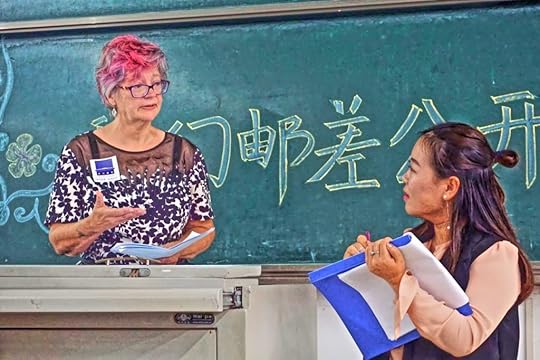 If you’re not familiar with SFWA’s official statement on Galaktika, here it is. If you’re unfamiliar with the situation overall, here is A.G. Carpenter’s write-up and here is Bence Pinter’s Hungarian article.
If you’re not familiar with SFWA’s official statement on Galaktika, here it is. If you’re unfamiliar with the situation overall, here is A.G. Carpenter’s write-up and here is Bence Pinter’s Hungarian article.
The SFWA statement is the result of a lot of work behind the scenes on the part of SFWA’s Grievance Committee, and I’d like to use this opportunity to both thank that committee and explain why it’s one of the answers to “why should I join SFWA?” (There are, in my opinion, a number of others.)
When I first became aware of what Galaktika had done, at first I had difficulty comprehending the scale of it. Surely it had to be a few stories rather than just one or two…but no, it was, literally, dozens. Then three figures worth of stories. Holy criminently.
The excuses that were sent to me as well as others over the course of the investigation chronicled here were manifest and sometimes a bit whiney. I was told that one author’s had been told their book had cost the company money and that therefore they owed it to the company to allow their work to be reprinted as advertisement for the other work.
In all of this, my hands were tied. What, realistically, could SFWA do, given legal and travel costs?
The answer was, actually, a decent amount in terms of keeping those affected informed and negotiating on their behalf, mainly because of the ninjas of Griefcom. Griefcom is the informal name for SFWA’s Grievance Committee, a small group of volunteers led by John E. Johnston III. I love John, whose politics are diametrically opposed to mine and with whom I share amiable political bickering and frequent recipes, and who feels as fiercely as I do that writers deserve both pay and control over their own work.
Griefcom’s members handle different areas: Ian Watson was the point person for the Galaktika issues and drafted the report on which I based SFWA’s formal statement about the magazine after much discussion with Johnston, Watson, and the SFWA board. Other members include Michael Armstrong (Novels), John Barnes (Work Made For Hire/Bookseller Relations), Michael Capobianco (Special Projects), Elizabeth Anne Leonard (Mediator), Lee Martindale (Senior Mediator), Ron Montana (TV and Film), and Eric James Stone (Short Fiction). Right now we are looking for someone experienced with game issues; drop volunteer@sfwa.org a line if you’re a member interested in volunteering.
Griefcom’s main weapon is the fact that it operates behind the scenes, and goes public only when necessary, which is why they came and asked me to make a statement about the situation. From my vantage point, I get a better picture than most people of what Griefcom does, and it’s a lot. Want to protect yourself so you won’t need their intervention? Read your contracts and never sign anything you don’t understand. Griefcom has been negotiating with Galaktika on behalf of several writers for months; they finally decided it was time to say something publicly.
Will Galaktika shape up? It remains to be seen. I hope so, and SFWA will revisit the matter in three months to follow-up and let folks know what Galaktika has done in the interim.
Is this actually a matter that SFWA should concern itself with? Absolutely. Recently it’s been underscored for me that people perceive SFWA as an American entity, but the truth is that we have a substantial international contingent. Worldcon in Finland poses a chance to spread that message, and so here’s a few things that I’m doing.
SFWA members scanning the most recent copy of the Singularity, SFWA’s bi-monthly e-newsletter for members, to find volunteer opportunities, will have noticed that I have a call out for translators. My plan is to get the SFWA membership requirements and questionnaire translated into as many languages as possible; I have commitments for Chinese, Filipino, Finnish, French, Klingon, Portuguese, Russian, and Spanish versions and am pursuing others. If you’re interested in helping with that effort, please let me know.
At the suggestion of Crystal Huff, I’m thinking about programming that might spread the message, such as a panel on the internationalization of SFWA. Such a panel would work for many conventions, I would think, but debuting it in Finland seems like a great idea (although we might sneak peek it at the Nebulas next May in Pittsburgh.)
I’m mulling over what form something connecting translators and F&SF writers might look like. Translating fiction requires not just ability with the language, but a writerly sensibility, an understanding of how to make the sentences fluid and compelling and three dimensional. So maybe something where potential translators could submit a listing of translation credits along with sample of their own work, translated into the languages they’re adept in, backed up with the ability for SFWA members to post testimonials. This seems like something the field needs; if anyone’s aware of existing efforts along these lines, please let me know?
Maybe it’s time for a new version of The SFWA European Hall of Fame , this time The SFWA International Hall of Fame. That seems like something for me to discuss with our Kickstarter contact. She and I have been discussing a 2018 project, reviving the Architects of Wonders anthology, but this might make a good interim effort. (Speaking of Kickstarter, SFWA partners with over three dozen institutions and companies, including Amazon, Kickstarter, and Kobo to make sure member concerns and suggestions are passed along as well as new opportunities created. If you’d like to be on the Partnership committee handling these monthly check-ins, drop our volunteer wrangler Derek a line at volunteer@sfwa.org.)
I’m actively soliciting feedback and suggestions for other ways to help spread the world that SFWA isn’t just for Americans. Let me know what you think.
(And, gah, I know I need to poke the gamewriting stuff along. I thought the Board was getting it done in my absence. I apologize, gamewriters. We ARE working on it. So many plates, all spinning so busily.)
September 25, 2016
Beijing/Chengdu Trip, September 2016: Some Notes, Observations, and Images

On the Great Wall.
No matter how many words I write, I cannot hope to put the magnificence, the splendor, the kindness, the warmth, the sheer amazeballs neatness of the trip. So here are some incoherent notes, jotted down in haste because otherwise I will just keep procrastinating on the writeup and it would be a shame to do so.General Notes and Context:
I was originally invited by the heads of the China World Science Fiction society, Renwei Dong, Haijun Yao, and Wu Yan, to attend the Chinese Nebula Awards ceremony in Beijing, through the kind offices of Ruhan Zhao. Later the invitation was extended by the company Xinhuanet for Wayne and I to then spend a week in Chengdu. It was our first trip to China; getting the visas got complicated and down to the last minute wire but finally everything arrived two days before the actual departure.
Arrival in Beijing and the Chinese Nebulas
We left September 7th and arrived in Beijing Thursday morning, where Kelly Song of China Educational Publications Import & Export Coporation (CEPIEC) and Ruhan picked us up at the airport. We had dinner that night with Mr. Dong, Ms. Song, and other members of the association.
The next morning Kelly took us and Crystal Huff, the Finncon co-chair who was also part of the Chinese Nebulas, to a lake reservoir and the Mungtian site of the Great Wall. It was everything I’d hoped and more, and a site that lives up to a writer’s imaginings is a rare one indeed.
 That evening we had dinner with Crystal, Kelly, Kelly’s boss Richard Lee, and her co-worker Martin at Huo’s restaurant, where we had Peking duck and other amazing foodstuffs. The wonderful floor show included noodle making, dough balloons, tea pouring, and a woah-wait-how-did-they-do-that face changing show. Afterwards we walked around a little bit, then took the subway (where Wayne enchanted a suspicious toddler) to see the Birds Nest and Olympic Park by night. The subway was a quicker way to get around than taxi most of the time and was very easy to use.
That evening we had dinner with Crystal, Kelly, Kelly’s boss Richard Lee, and her co-worker Martin at Huo’s restaurant, where we had Peking duck and other amazing foodstuffs. The wonderful floor show included noodle making, dough balloons, tea pouring, and a woah-wait-how-did-they-do-that face changing show. Afterwards we walked around a little bit, then took the subway (where Wayne enchanted a suspicious toddler) to see the Birds Nest and Olympic Park by night. The subway was a quicker way to get around than taxi most of the time and was very easy to use.
We stayed at the National Library Hotel, which had a wonderful bookish modern but still traditional vibe, and had breakfasts most mornings there. The ceremonies were held nearby, and started with a red carpet walk and the signing of a wall.
We were treated very well. I found that SF is currently very hot in China. Overall, recent wins by Cixin Liu have drawn significant attention to SF in China. In all of this, I am speaking primarily about science fiction, rather than fantasy, since the Chinese see the two genres as very distinct from each other. There has also historically been tension between science writing and science fiction, which is the past has been perceived as being aimed at children, or at least that is something that came up multiple times over the course of the visit.
Nowadays, that’s very different. Numerous groups in China are working on putting together Worldcon bids and I would suspect the question is not so much whether or not we’ll see a Worldcon bid from China in coming years so much as which city will host it: Beijing, Chengdu, or Shanghai. Several people, including the World Science Fiction Society, said that they’d love to see SFWA’s Nebulas hosted over in China if we’re ever interested in doing that. Crystal Huff had been sponsored by the first group as part of their effort to research what would be needed to run a Worldcon.
One of the things that I really noticed at the ceremonies and the signing that occurred the next day: the Chinese fans really love science fiction. I sat next to Cixin Liu at the signing and some of his fans were vibrating with the joy of interacting with him to a point that I might have reserved for Paul McCartney when I was a teen-age Cat. They were adorable. They also — and the writers as well — skewed considerably younger than the overall crowds I see at the usual Nebula or other American gatherings. Many of these folks are the future, and I’m pleased to get a chance to interact with so many of them.
The next day Kelly and Martin took Wayne, Crystal, and I in for interviews and to meet with the head of (), who went with us for a delicious lunch. Afterwards we went with Martin over to Beiha Park, where we went boating, and then strolled the grounds, viewing the last of the lotus blossoms. We were lucky to be there for the Autumn Festival, so we ate lots of kinds of the traditional moon cakes, and Kelly brought us a big bagful of them when we set off.
Mr. Dong made sure we were well taken care of throughout our visit to Beijing and that we had everything we needed. Sean Gao very kindly postponed his flight back to Chengdu in order to accompany our hapless selves, which was good, because we needed his linguistic intervention a couple of times as we bewildered someone.
Chengdu and Xiuhuanet
In Chengdu, we were met by Tulip, who was our interpreter, and JingJing of Xinhuanet and her assistant Annie. They took us to the hotel and then out with Sean to what turned out to be the first of AMAZING meals. SO DELICIOUS. SO DELICIOUS.
Luckily for me, Tulip furnished a detailed itinerary, so I can be extremely precise here:

Ancient village with modern kids and bubbles.
September 15th:
Wuhou shrine, Jinli street
Jinsha site museum/Huang longXi ancient town
Here was my first encounter with Zhuge Liang, an early paragon of wisdom whose shrine this is, although it shares space with the temple of Liu Bei (a Chinese emperor). Very green and serene and historic. From there we walked over to Jinli street, which featured all sorts of crafts and foods, including displays of silkworm cocoons being unspun and the silk threads being processed to make into comforters. JingJing bought spicy peanut candy; next time I’m trying some of the spun sugar candy, like the phoenixes we saw being displayed.
Lunch! And then to the ancient town, which was in a fruit-growing area, with piles of grapes, figs, and kiwis for sale along the road. The town was very cool, and featured more kinds of crafts, this time including some freshwater pearls and nifty masks carved from bamboo root. This was where I picked up a new mask for my collection.

Asking for genius.
September 16thPanda base in Dujiangyan city
Dujiangyan irrigation program
Hexiang mountain villa
Pandas! No cuddling them, alas, but lots of looking and learning about them, all in beautiful surroundings and taken around by a nice guide who answered all sorts of questions. After that, Dujiangyan, which was super cool and much more interesting than the phrase “irrigation program” might imply. For one thing, it was built in 256 BC and still controls water for over 5000 square kilometers of farmland not via a dam system, but by dividing and channeling the water via ingenious means of long wicker baskets filled with stones, called zhulong, which ended up making the Sichauan district the most productive in the country.
Lots of greenery, in many ways a shrine to water and very beautiful. Here we met Zhuge Liang again, and had our photo taken with him, a tradition meant to evoke his genius in the person touching his hand. After that we headed to a new hotel, the Hexiang mountain villa, a hotel built to evoke an old Chinese palace, which had a lot of beautiful carvings. There was a wedding going on there the same night, with a ton of people; it looked like a gorgeous place for a reception.

Limbering up in the morning before setting off for the mountain.
September 17
Qingchen Mountain
Afternoon – Taiguli street
Watching Sichuan opera
In the morning, we watched a little tai chi being staged in the courtyard then ate breakfast at the hotel before heading to Qingchen Mountain, the birthplace of Taoism, and learned a good bit about both Taoism and Buddhism on our trip up the mountain. Very green and clean, with a beautiful lake halfway up.
Back in Chengdu that evening, we strolled through one of the shopping districts, Taiguli Street, which was full of international goods and high fashion store. After dinner, we headed to watch a show that included plenty of opera along with some other wonderful staged stuff, including a reiteration of amazing mask dancers.
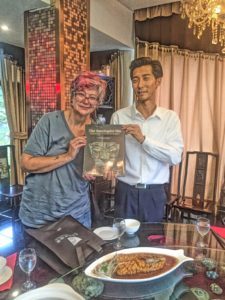 September 18
September 18
Sanxindui site museum
Evening speech at Southwest Jiaotong University
Another amazing trip, this time to see bronzes from 4000 years ago, in a very cool museum. The director was kind enough to have lunch with us. That night, after yet another terrific dinner. I made a speech at the university to a crowd of perhaps 50 or 50 students, who asked all sorts of interesting questions, and brought me flowers, a beautiful arrangement of lilies that made the hotel room very fragrant.
September 19
Wuhou district Sci-fi town
Xinhua.net and interview
Dinner – hot pot!
In the morning we went for a tour of The Wisesoft virtual reality studio, and learned a lot about the Wuhou District, in a meeting that included Jing Gong, Director of the Chengdu Wuhou District Broadcasting Press and Publication Bureau, After that we went to Xinhua.net, where I did a couple of interviews and spent some pleasant time with JingJing’s boss Dawei Hou, and Vice President, Jiangying Shen.
Things I Learned about Chinese SF
Some writers I want to point to so I have their names stuck here for future reading. Many of them were there at the Nebulas.
New friends!
Que A, Shu Bao, Liu Bing, Zhang Cao, Xia Chao, Hongyu Chen, Qiufan Chen, Jingbo Cheng, Bessie Gu, Bo Jiang, Ni Kuang, Xingshi Liu, Yang Lu, Xe Lv, Xiong Mo, Han Song, Jinkang Wang, He Xi, Xinghan Xiao, Wang Xiaoda, Jian Wu, Huang Yi, Ran Zhang, Wenjing Zhang, Jun Zheng, Zinghzi Zhou
In all of this, I should mention that more than anyone else, Ken Liu has really led the way and shaped SF decades to come by bringing so much attention to Chinese SF. Cixin Liu (who gave me a copy of his third book that I am looking forward to finishing this week) may be Da Liu in China, but surely Ken deserves his own descriptor.
Traveling Tips for Other American SF Writers Visiting China for the First Time
Wifi is everywhere, but the Internet can be frustrating. Facebook and Twitter are censored in China; Wechat is a Chinese version of Facebook that is very popular. I started the trip with just a couple friends on Wechat and now have several dozen. (I am Catrambo on Wechat; feel free to add me.) One implication of the Facebook/Twitter ban is that if you have plug-ins from either social network on your website Chinese readers will have to use a VPN to access your website, which is why I’ve removed the Twitter plugin from my site. It is pretty easy to get a VPN connection through various applications however.
An important note for Americans: water is different there. You cannot drink tap water (I would be careful even using it to rinse after brushing one’s teeth) and sometimes where American restaurants routinely provide water, Chinese establishments will not. For example, I got in the habit of taking a bottle with me to breakfast in Beijing, because the only drink provided there was hot milk, along with a lot of tasty but very dry food.
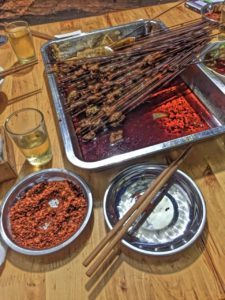
All the food was terrific!
The food is GREAT — particularly if you are willing to be adventurous. Stuff I ate there that I’ve never had in America included two variations on chicken feet, pork brains and throats, duck guts, tiny eels — and that’s just what stood out. In Chengdu in particular, it was amazing, but spicily yummy. Jing Jing was very kind about buying all sorts of treats for us: spicy nuts, ding-ding candy, fruit, and more. She even brought me Mongolian hot pot makings, and I’m trying that tonight, after a trip to Uwajimaya. If you are a very picky eater or have dealbreaker food allergies, you may want to make sure you’ve got an emergency supply sufficient for a few meals with you.Along the same practical lines, a friend told me they were worried about the toilets. Well, they are a different mode than we see here in the US, but anyone who’s survived toilets someplace like a concert or a county fair is probably going to be able to navigate the worst of it. I dunno. What one is doing remains much the same worldwide. You should remember to carry a few tissues with you; you’ll need it maybe one in three times.
People are super nice overall. Schoolkids in particular want to test out the English they’re learning in school and will Hello how are you and/or ask for a photo with you. While out sightseeing, I noticed people noticing us but it never felt obtrusive or creepy and they would often smile and exchange greetings. This is a point where people’s mileage may vary considerably — I am usually in the midpoint between introvert and extrovert, but have found that the SFWA presidency has nudged me over to extrovert by about 20 points.
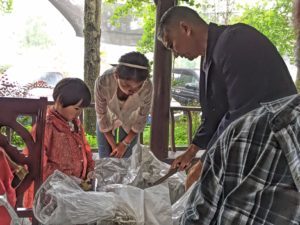 Generally the degree of enthusiasm most American SF writers not familiar with the culture will feel while in China will depend greatly on their ability to operate outside their comfort zone and willingness to be a little flexible, patient, and find misunderstandings funny rather than frustrating. My happiness with the trip is shaped from how much I fell in love with the language and culture as I prepped for the trip, and I know this has been a life-changer in at least a few ways. For one, I’m much more aware of Chinese SF and likely to seek it out. For another, I’m keeping up with my Mandarin study/practice. And finally, I know some of the friendship I made during the trip are ones that will last and deepen in coming years.
Generally the degree of enthusiasm most American SF writers not familiar with the culture will feel while in China will depend greatly on their ability to operate outside their comfort zone and willingness to be a little flexible, patient, and find misunderstandings funny rather than frustrating. My happiness with the trip is shaped from how much I fell in love with the language and culture as I prepped for the trip, and I know this has been a life-changer in at least a few ways. For one, I’m much more aware of Chinese SF and likely to seek it out. For another, I’m keeping up with my Mandarin study/practice. And finally, I know some of the friendship I made during the trip are ones that will last and deepen in coming years.
Overall, I came away from this trip filled with a great deal of joy and optimism for the future. I was reminded that while there may be all sorts of weird convulsions in the day to day course of things, humanity continues to plod onward and that the motion is generally upward, even when the speed of that trend may not be all we’d hoped. A lot of the casual sexism, racism, and classism I saw as a child or teen is gone, even though sometimes it seems as though it keeps trying to manifest in new shaggy-haired forms. Now China is opening up and with it even more new voices. Fabulous!
Will I go back? Yup. In fact, I’ve already pencilled the Chinese Nebulas in on my 2017 calendar and if I can make it sooner, I may, because I really did enjoy the folks and the sights and everything to the point where I was saddened to leave, plus there are a bunch of things I missed that I want to go back for.
Some resources for additional reading:
An article about SF World, China’s Science Fiction publication
SF fan and news organization Future Affairs Administration associated with Guokr Publishing.
World of Chinese magazine. Article on the history of Chinese SF.
Article on the Three Generals of Chinese SF
Life Week Magazine
August 16, 2016
The Fireside Fiction Report and SFWA

Outside the comfort zone is where the best art lies.
I apologize for not blogging about this sooner. It’s been a busy month, and things are only getting busier, with Worldcon tomorrow and then China in September. Someone wrote asking me to comment on the Fireside Fiction report, and this is what I’ve been thinking.Like many folks, I read the Fireside Fiction report with dismay and anger, but not a lot of surprise. We’ve been talking on the SFWA Board about the findings this past week.
What can SFWA do about it? I could go in full guns blazing and demand that every editor involved in the situation resign and threaten to take markets off the Qualified List if they don’t shape up immediately. This action would, however, probably get nipped in the bud the minute I proposed it to the rest of the board. As I’ve noted before, SFWA is slow and hard to steer. Enforcement on this level is also difficult and impractical, I think, because this selection doesn’t usually happen in the open or in an overt way.
One of the reasons I keep insisting that magazines should be reading blind is that unconscious bias plays a major part in selecting things, which has been demonstrated in study after study. Conventions should be doing panels not on why to read blind, but how to implement it in a working way. Can we insist that magazines read blind? It might work better to encourage it, perhaps, by publicizing the ones that do. And I will point out that magazines who specifically say they welcome diverse stories seem to get more. Submission guidelines do matter.
So do slush readers. They’re one of the first lines of defense around those markets. Magazines need to pay attention to their slush readers, and train them read outside their comfort zone in order to find good stuff. A editor that doesn’t dip into the rejected pile every once in a while may miss some gems as well as a chance to teach their slush readers. That’s how I found Jessica Lee’s Superhero Girl.
One of the more radical things SFWA’s done during my time on the Board is to admit independently and small press press writers. One focus since then has been making sure we give those writers the resources they need not just to write, but to promote their work. This is a good step, but insufficient in this case. Self-publishing is one of the ways around the gatekeepers, but L.E.H. Light mentions this in his piece, “The Fireside Fiction Report: A Reader/Critic’s Perspective“, saying:
“What level of segregation are we headed towards when we get comfortable with having ONLY our own publications as our voice in the genre? And what alternative sources of success, cash flow, and critical acclaim are we walking away from? Can we not have both our own publications and inclusion in “mainstream” works, thereby reaching wider audiences and providing opportunities for more writers? This is an eternal debate, and one which there need never be a solution to. But it is one we need to continue to have, in conjunction with a dedication to support both “streams” of production when possible, so that we pressure the industry both from within and without.”
Writing workshops are a traditional means of networking and support for new writers, but we must acknowledge that scholarships are not enough. The writers workshops tend to advantage the people who already have a good bit of economic privilege, and while scholarships help folks get into the workshop, it’s primarily middle-class folks who have the resources to take six weeks off work and travel.
Remote education may be one of the best bets, material that people can learn from on their own speed and schedule. Right now we’re working on an initiative, led by Maggie Hogarth, called SFWA Ed, that I hope will be helpful in this regard. Classes will focus on craft, business stuff, and the history of speculative fiction. One of the early efforts being worked on right now is an overview of copyright basics, aimed at writers, that will help them from being taken advantage of, for instance.
Setting a good example is one of the best things SFWA can do. Making sure that our Board is a diverse range of members as well as trying to listen to member needs. Making sure our programming at the Nebula Conference doesn’t use black writers only on diversity panels, and that the Recommended Reading list covers a wide range of writers. I actively hunt for good stuff to add to the reading list and I try to find the stuff that people might not run across elsewhere.
Sponsoring more studies like this, trying to get at some of the whys and wherefores, would be great. Unfortunately, something like that would have to get added to the 2017-2018 budget; there’s no room in the current budget, which has been flensed to the point where some efforts had to be shelved.
Personally, I have found the best way to combat bias in yourself is to self-educate — and then act using that knowledge. I belong to a Facebook group called How to Talk to Other White People about Race”, which has furnished me with a lot of useful tools, but I don’t want to wade into the fray acting like I know everything, because I don’t. I want to help, and I worry that some actions don’t accomplish that or actually detract from the conversation. If you’ve got suggestions, feedback, commentary, or resources, I’m listening.
Some additional useful links:
Justina Ireland discusses the report
Phenderson Djèlí Clark on submitting SFF while black
Rose Lemberg on marginalized writers and self-rejection
#sfwapro

